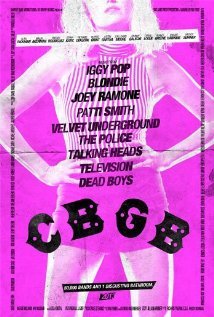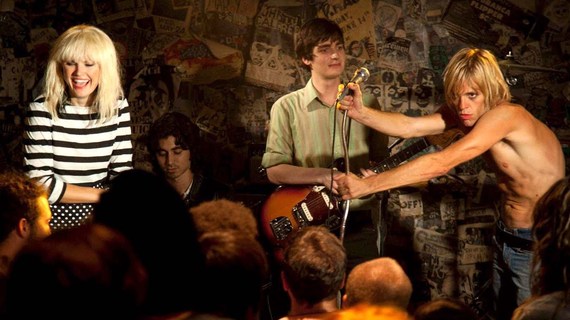The just-released film, CBGB, about the grungy Manhattan club called CBGB that more or less gave birth to punk rock, has a great soundtrack and something important to say. It's also very funny.
Unfortunately, your chances of actually seeing CBGB in theaters at the moment are slim.* Distribution of the film dried up after the indie biopic got panned by reviewers like the New York Times' A.O. Scott.
Wait! Before you let Scott ruin the film for you, consider the peculiarity of his logic. First Scott damns the film for allowing punk songs (by now-classic groups like the Police, Blondie, The Ramones) to be lip-synced from studio recordings, which is un-spontaneous and, you know, immoral. Scott then twists his own logic into a tight pretzel by adding that not lip-syncing the songs would have been far worse ("...no one wants to hear bad new renditions of great old tunes").
In short, punk music is sacred territory, and no film about it must ever be made.
Nonsense. If you can make a film about The Lord of the Rings, don't tell me the punk scene is too sacred to be replicated on celluloid. And the gist of most of the negative reviews was basically that the film isn't the actual club, but should have been. It is a case of misplaced piety. Yet CBGB succeeds quite well enough to be highly entertaining and it makes two timely points.
The first has to do with the scourge of utilitarianism: the belief that that only the generically useful is important and that it doesn't matter what one does so long as one makes money doing it. Look. Here's my theology as far as that is concerned: When forced to choose between utilitarianism and immorality, choose immorality.
 Why? Because if you start with something that is alive, you can improve it morally over time. But if you start with something that is already dead, well, you can't do a damn thing with it, can you? And utilitarianism kills everything it touches. Modern retailing (big box stores), the financial "services" industry, the real estate industry, the politics industry... it's all utilitarian and it's all dead. Well, mostly dead, anyway.
Why? Because if you start with something that is alive, you can improve it morally over time. But if you start with something that is already dead, well, you can't do a damn thing with it, can you? And utilitarianism kills everything it touches. Modern retailing (big box stores), the financial "services" industry, the real estate industry, the politics industry... it's all utilitarian and it's all dead. Well, mostly dead, anyway.
CBGB is about the rejection of utilitarianism. The details of the punk style -- the lewdness, the filth, the screaming protests -- it's all secondary, man. Despite the dastardly lip-syncing in the movie, that point comes through quite nicely. Punk, confronted with the fateful choice, chose to stay alive. Immoral sometimes, but definitely alive.
What is more, the reason punk managed to live a long life is largely because Hilly Kristal, the man at the heart of CBGB -- both the club and the film -- also wasn't a utilitarian. Kristal, played with sometimes frustrating realism by a frumpy Alan Rickman, simply didn't give a damn about money. (Confronted with a sign in a bank urging people to save for their dreams, Kristal remarks: "Why would you save for your dreams? Why not live your dreams?").
Christy Lemire of RogerEbert.com faults the film for depicting this guy, Kristal, who manages his business so poorly that he couldn't even pay the rent. Inexplicable! People: You have to watch the movie before reviewing it. It wasn't because Hilly Kristal was giving away free beer, Christy. The reason he "managed money so poorly" and hadn't enough to pay his rent was, first, because he very obviously found money a blooming bore. And second, because he was keeping his punk rock wards alive by giving them his money. You know, so that they could eat and stuff. This was before they were famous.
The movie's second, related message has to do with how to go about making places and cities that are interesting and, yes, alive.
Everyone wants city centers to be "revitalized" these days, so that they will lure the "right kind of consumers": 20-somethings and hip empty-nesters who are well-traveled. To achieve this desired end, it is said, one has to start with the basics. First you make the place clean and safe. Then you create destinations, and you do that by consolidating properties -- the more the better -- and then applying one of the formulas that global capital feels comfortable financing because it has worked elsewhere.
Yawn. CBGB shows up the folly of attempting to create what is actually wanted -- which is a place that has life -- by means of a formula. Clean and safe? Now, call me a hypocrite, but I am going to agree with the film critics in at least one respect. There was just a wee bit too much dog poop in this movie and, especially, in this club. What was up with Hilly Kristal's dog constantly relieving himself on the wooden floor of this place? The filthy toilets I could just barely deal with, but dog shit? Come on!
So it wasn't clean, that's for sure. But neither was it safe. The Bowery in those days was a shit hole. Early in the film Kristal finds a dead body on the sidewalk in front of his door. The building that houses the club looks like it should be condemned. The place is crawling with cockroaches, drug addicts...
And yet the club, once it gets off the ground, is successful in the one crucial sense: It was packed every night. Why? Because Hilly Kristal made CBGB a place for listening to music written and performed by people who didn't give a damn about formulas, but who did care, even at the cost of everything else, about feeling alive. This place came alive in the only way that anywhere at any time can come alive: because a particular person bought this particular place and did something there that he loved doing.
It's no easy feat, and harder to do somewhere today, whether you're in Manhattan or, say, Montgomery County, MD. The reigning utilitarian approach to city building creates bright boring places with high rents. Imagination, new ideas, new music styles -- as urbanist Jane Jacobs already told us 40 years ago -- require low rents. Those tend to occur in floppy old buildings in dicey neighborhoods. Which is why we shouldn't knock all those places down if we want our cities to have life.
Now, speaking for myself, I kind of like clean, and I prefer safe too, given the choice. But life itself is neither clean nor safe. And neither was CBGB.
*CBGB is available for rent and on iTunes
